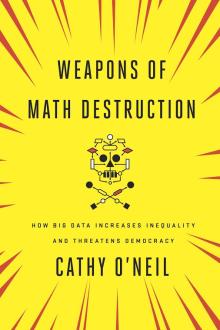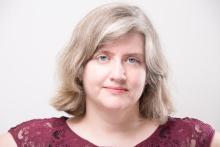
Weapons of Math Destruction
Weapons of Math Destruction traces the arc of a person’s life, from school to retirement, and looks at models that score teachers and students, sort résumés, grant (or deny) loans, evaluate workers, target voters, set parole and prison sentences, and monitor our health. The models being used are opaque, unregulated, and uncontestable, even when they’re wrong. Most troubling, they reinforce discrimination: If a poor student can’t get a loan because a lending model deems him too risky (by virtue of his race or neighborhood), he’s then cut off from the kind of education that could pull him out of poverty, and a vicious spiral ensues. O’Neil has dubbed these harmful models Weapons of Math Destruction, or WMDs. In our society, where money buys influence, WMD victims are nearly voiceless. These models are propping up the lucky and punishing the poor and oppressed, creating a toxic cocktail for democracy. But the poor are hardly the only victims of WMDs. They hit the middle class, too. Even the rich find themselves micro-targeted by political models.
In Weapons of Math Destruction, O’Neil not only exposes the many ways that mathematical models are determining our futures, but she also offers ideas for making models more transparent and using them to promote positive social change. She emphasizes the importance of demanding transparency, embedding better values into our algorithms, and creating big data models that follow our ethical lead. As she notes in her book, “We must come together to police these WMDs, to tame and disarm them. Math deserves much better than WMDs, and democracy does too.”
Part exposé, part polemic, and part call to action, O’Neil’s Weapons of Math Destruction digs deep into the mathematical engines that are running the modern world, warning about the tyranny of software.
Presented in partnership with the Wisconsin Science Festival.
Cathy O'Neil

Cathy O’Neil received her Ph.D. in mathematics from Harvard University and, after a brief stint in academia, landed a position as a quant on Wall Street. She was eager to put her math skills to use, predicting movements in the market. But when she realized that the hedge fund she was working for was betting against people’s retirement funds, she became deeply disillusioned. Math was being used in a way she felt was immoral. She left Wall Street and became the financial advisor to the Occupy Movement, bringing their message to audiences from NPR’s Morning Edition to the WGA “Best Documentary” award-winning Frontline episode called “Money, Power, and Wall Street. She then became a data scientist for a New York start-up. Now she is an evangelist for the cause that is at the heart of her book. O’Neil is uniquely suited to talk about the social and political implications of this kind of math, given her deep knowledge of modeling techniques and an insider’s understanding of how companies are using them.
Cathy O'Neil on NPR's "All Things Considered"
